七年级下英语第11单元
- 格式:ppt
- 大小:4.31 MB
- 文档页数:46
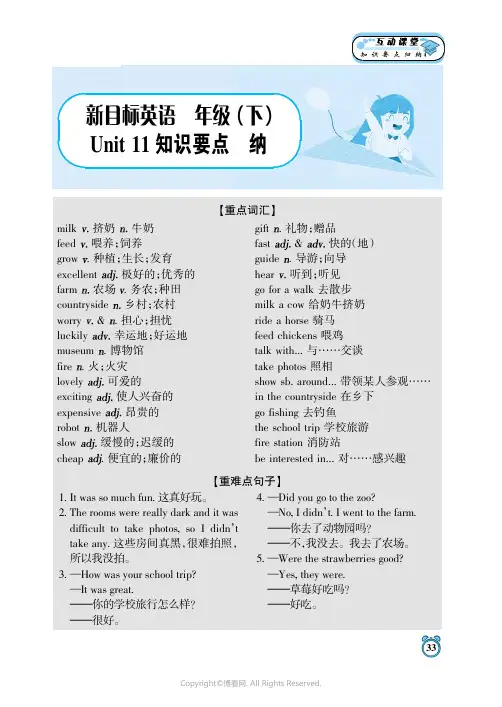
栏纳milk 挤奶牛奶feed 喂养;饲养grow .种植;生长;发育excellent 极好的;优秀的farm 农场.务农;种田countryside 乡村;农村worry &.担心;担忧luckily 幸运地;好运地museum .博物馆fire .火;火灾lovely 可爱的exciting 使人兴奋的expensive 昂贵的robot 机器人slow 缓慢的;迟缓的cheap .便宜的;廉价的gift .礼物;赠品fast &快的(地)guide .导游;向导hear 听到;听见go for a walk 去散步milk a cow 给奶牛挤奶ride a horse 骑马feed chickens 喂鸡talk with...与……交谈take photos 照相show sb.around...带领某人参观……in the countryside 在乡下go fishing 去钓鱼the school trip 学校旅游fire station 消防站be interested in...对……感兴趣1.It was so much fun.这真好玩。
2.The rooms were really dark and it was difficult to take photos,so I didn ’t take any.这些房间真黑,很难拍照,所以我没拍。
3.—How was your school trip?—It was great.———你的学校旅行怎么样?———很好。
4.—Did you go to the zoo?—No,I didn ’t.I went to the farm.———你去了动物园吗?———不,我没去。
我去了农场。
5.—Were the strawberries good?—Yes,they were.———草莓好吃吗?———好吃。
【重点词汇】【重难点句子】33Copyright ©博看网. All Rights Reserved.。
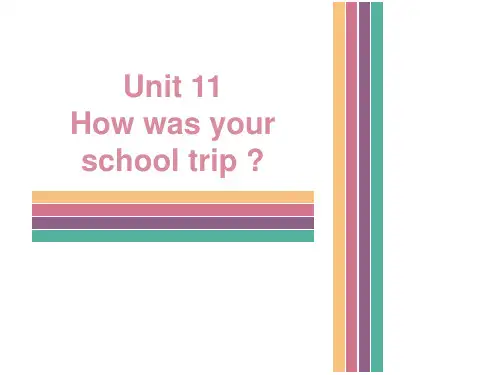
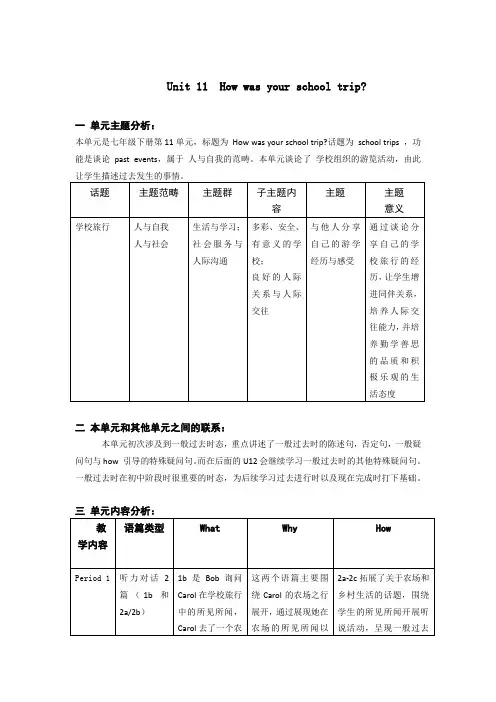
Unit 11 How was your school trip?一单元主题分析:本单元是七年级下册第11单元,标题为How was your school trip?话题为school trips ,功能是谈论past events,属于人与自我的范畴。
本单元谈论了学校组织的游览活动,由此二本单元和其他单元之间的联系:本单元初次涉及到一般过去时态,重点讲述了一般过去时的陈述句,否定句,一般疑问句与how 引导的特殊疑问句。
而在后面的U12会继续学习一般过去时的其他特殊疑问句。
一般过去时在初中阶段时很重要的时态,为后续学习过去进行时以及现在完成时打下基础。
四单元教学目标:1.能正确使用be动词的一般过去时描述或询问过去的状态。
2. 能正确使用实义动词的一般过去时描述或询问过去发生的事情。
3.能根据动词过去式推测动词原形,尝试归纳规则动词的过去式的特点及变化规律。
4.能通过阅读本单元两篇日记理解不同人对待同一事物的不同感受.5.了解国内外学校组织的各种游览活动。
Unit 12 What did you do last weekend?一单元主题分析:本单元是七年级下册第12单元,标题为What did you do last weekend?话题为Weekend activities,功能是谈论past events,属于人与自我,人与社会的范畴。
本单元谈论了常见的周末活动,由此让学生进一步掌握一般过去式的用法,尤其是一般过去二本单元和其他单元之间的联系:本单元是七年级下册的最后一个单元,从语法上来说,从语法上来说起到了承上启下的左云初次涉及到一般过去时态,重点讲述了一般过去时的陈述句,否定句,一般疑问句与how 引导的特殊疑问句。
而在后面的U12会继续学习一般过去时的其他特殊疑问句。
一般过去时在初中阶段时很重要的时态,为后续学习过去进行时以及现在完成时打下基础。
四单元教学目标:1.能够听懂关于谈论周末活动的对话内容,培养学生提取关键信息的能力2.用带有who, where, what等特殊疑问词的一般过去时的句子询问信息,并能做出正确的回答。
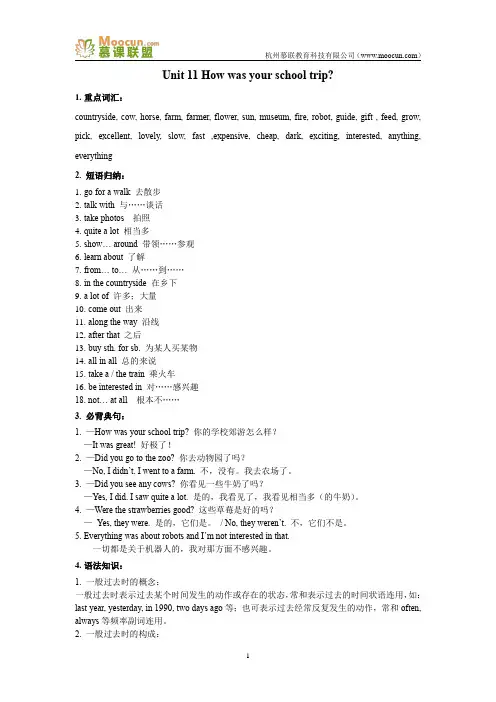
Unit 11 How was your school trip?1.重点词汇:countryside, cow, horse, farm, farmer, flower, sun, museum, fire, robot, guide, gift , feed, grow, pick, excellent, lovely, slow, fast ,expensive, cheap, dark, exciting, interested, anything, everything2. 短语归纳:1.go for a walk 去散步2.talk with 与……谈话3.take photos 拍照4.quite a lot 相当多5.show… around 带领……参观6.learn about 了解7.from… to… 从……到……8.in the countryside 在乡下9.a lot of 许多;大量e out 出来11.along the way 沿线12.after that 之后13.buy sth. for sb. 为某人买某物14.all in all 总的来说15.take a / the train 乘火车16.be interested in 对……感兴趣18. not… at all 根本不……3. 必背典句:1. —How was your school trip? 你的学校郊游怎么样?—It was great! 好极了!2. —Did you go to the zoo? 你去动物园了吗?—No, I didn’t. I went to a farm. 不,没有。
我去农场了。
3. —Did you see any cows? 你看见一些牛奶了吗?—Yes, I did. I saw quite a lot. 是的,我看见了,我看见相当多(的牛奶)。
4. —Were the strawberries good? 这些草莓是好的吗?—Yes, they were. 是的,它们是。
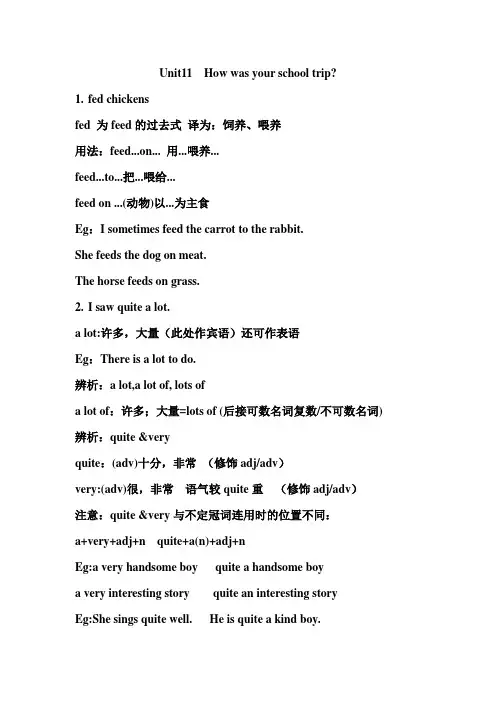
Unit11 How was your school trip?1.fed chickensfed 为feed的过去式译为:饲养、喂养用法:feed...on... 用...喂养...feed...to...把...喂给...feed on ...(动物)以...为主食Eg:I sometimes feed the carrot to the rabbit.She feeds the dog on meat.The horse feeds on grass.2.I saw quite a lot.a lot:许多,大量(此处作宾语)还可作表语Eg:There is a lot to do.辨析:a lot,a lot of, lots ofa lot of:许多;大量=lots of (后接可数名词复数/不可数名词) 辨析:quite &veryquite:(adv)十分,非常(修饰adj/adv)very:(adv)很,非常语气较quite重(修饰adj/adv)注意:quite &very与不定冠词连用时的位置不同:a+very+adj+n quite+a(n)+adj+nEg:a very handsome boy quite a handsome boya very interesting story quite an interesting storyEg:She sings quite well. He is quite a kind boy.This kind of fruit is very healthy. Thank you very much.3.Did you learn anything?辨析:anything&somethinganything:(不定代词)任何事物;某事物(常用于否定句/疑问句中) something:(不定代词)某事(常用于肯定句中) 但是在表示请求、建议、或征求意见的疑问句中常用something注意:(1)adj修饰不定代词,要位于其后(2)不定代词作主语时,谓语动词用单数形式(3)补充其他不定代词some any no every/body thing oneEg:There isn’t anything wrong.There is something wrong with my puter.4.The farmer showed Carol around the farm.farmer:(n)农民farm:(n)农场;(v)干农活farming:(不可数n)农事Eg:The farmers are working on the farm,and there is too much farming.show sb.around...带某人到处参观...Eg:The guide shows us around the museum.与show相关的短语:show sb.sth=show sth.to sb.给...看展示on show 展览show off 炫耀show up出现5.The farmers don’t grow apples.grow:(vt)种植;栽培(vi)生长;发育Eg:Farmers in the south of China mainly grow rice.Everything begins to grow in spring.短语:grow up成长,长大grow into成长为;发展成(由一种情况变成另外一种情况)Eg:I want to be a guide when I grow up.She grows into a lovely girl.辨析:grow&plantgrow: 种植(强调过程/状态)plant:(v)种植(仅表示栽入土中,表示动作)(n)植物Eg:The farmers grow a lot of trees every year.The farmers plant lots of trees every year.There are many different plants in the garden.6....we worried it would rain.worry:(vt)担心;担忧后常接宾语从句Eg:His parents worry that their child will sick.(vt)使担心;使发愁(常接sb.作宾语)Eg:The naughty boy worries his parents.worry about sb./sth.=be worried about sb./sth. 担心某人/某事Eg:Don’t worry about me ./Don’t be worried about me.7.Luckily,it didn’t,and the sun came out again.(1)luckily(adv)幸运地常用于句首,用逗号隔开unluckily不幸地unfortunately fortunate(adj)幸运的fortunately(adv)幸运地以辅音字母+y结尾的形容词变成副词的方法:改y为i再加ly Eg:happy lucky busy angry easy(2)sun moon earth star 都是世界上独一无二的事物,前面必须加the(3)e out出来;发芽;开花;出版与e相关的短语:e from来自 e on加油;快点 e back 回来e down 下来 e in 进来 e up with 提出;想出;赶上e across遇到8.expensive/cheapexpensive/cheap只能形容事物的贵贱;当谈论价格(price)时,只能用high/lowEg:The pen is cheap.=The price of the pen is low.9.All in all,it was an exciting day.all in all:总的来说;总之in a word:简言之in short:总之Eg:All in all, it’s good for you to do more exercise.辨析:all in all, in all,at allall in all:总的来说(常用于句首)eg:All in all, we had a good time. in all:总共;合计(句首/句末)eg:There are fifty students in all.at all:根本常用于“not at all”根本不Eg:He doesn’t like apples at all.与all相关的短语:all the time 一直after all 毕竟10.I didn’t like the trip at all.Not at all 用于回答感谢/道歉Eg:Thank you very much.Not at all.其它的回答:It’s my pleasure. It’s a pleasure. No problem.You’re wele. That’s all right. That’s OK.一般过去时态含义:表示过去某个时间发生的动作或存在的状态,也表示过去经常或反复发生的动作。
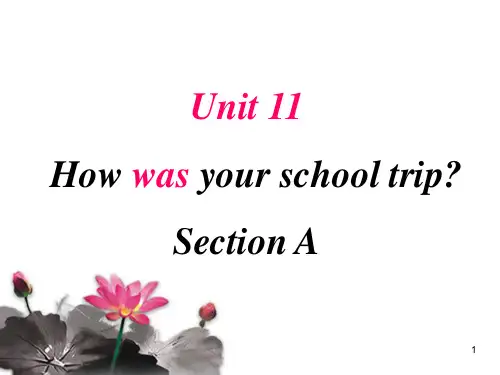
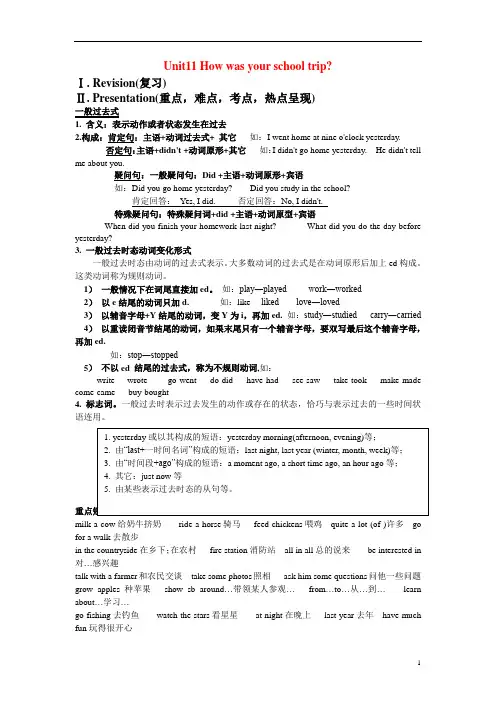
Unit11 How was your school trip?Ⅰ. Revision(复习)Ⅱ. Presentation(重点,难点,考点,热点呈现)一般过去式1. 含义:表示动作或者状态发生在过去2.构成:肯定句:主语+动词过去式+ 其它如:I went home at nine o'clock yesterday.否定句:主语+didn't +动词原形+其它如:I didn't go home yesterday. He didn't tell me about you.疑问句:一般疑问句:Did +主语+动词原形+宾语如:Did you go home yesterday?Did you study in the school?肯定回答:Yes, I did. 否定回答:No, I didn't.特殊疑问句:特殊疑问词+did +主语+动词原型+宾语When did you finish your homework last night? What did you do the day before yesterday?3. 一般过去时态动词变化形式一般过去时态由动词的过去式表示。
大多数动词的过去式是在动词原形后加上ed构成。
这类动词称为规则动词。
1)一般情况下在词尾直接加ed。
如:play―played work―worked2)以e结尾的动词只加d. 如:like--- liked love―loved3)以辅音字母+Y结尾的动词,变Y为i,再加ed. 如:study―studied carry―carried 4)以重读闭音节结尾的动词,如果末尾只有一个辅音字母,要双写最后这个辅音字母,再加ed.如:stop―stopped5)不以ed 结尾的过去式,称为不规则动词,如:write --wrote go-went do-did have-had see-saw take-took make-made come-came buy-bought4. 标志词。
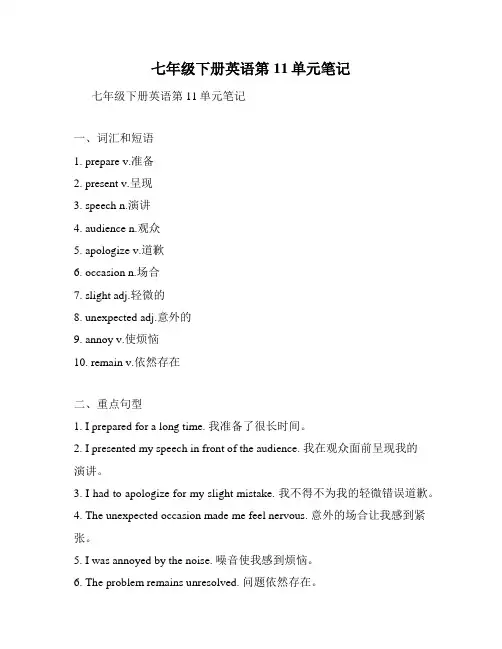
七年级下册英语第11单元笔记七年级下册英语第11单元笔记一、词汇和短语1. prepare v.准备2. present v.呈现3. speech n.演讲4. audience n.观众5. apologize v.道歉6. occasion n.场合7. slight adj.轻微的8. unexpected adj.意外的9. annoy v.使烦恼10. remain v.依然存在二、重点句型1. I prepared for a long time. 我准备了很长时间。
2. I presented my speech in front of the audience. 我在观众面前呈现我的演讲。
3. I had to apologize for my slight mistake. 我不得不为我的轻微错误道歉。
4. The unexpected occasion made me feel nervous. 意外的场合让我感到紧张。
5. I was annoyed by the noise. 噪音使我感到烦恼。
6. The problem remains unresolved. 问题依然存在。
三、笔记内容本单元主要内容是关于演讲和场合的词汇和短语,同时也涉及了一些表达道歉、提出问题和给予建议的实用句型。
在这个单元中,我提前准备了很长时间,然后在观众面前呈现了我的演讲。
尽管我犯了一个轻微的错误,但我不得不为此道歉。
这个闹出意外的场合让我感到紧张。
同时我也掌握了如何表达烦恼以及问题如何依然存在的应对方式。
在下个演讲中,我会更好的准备,而噪音和其他障碍对我不会再产生烦恼。
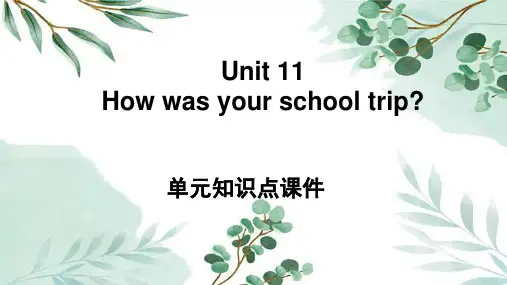
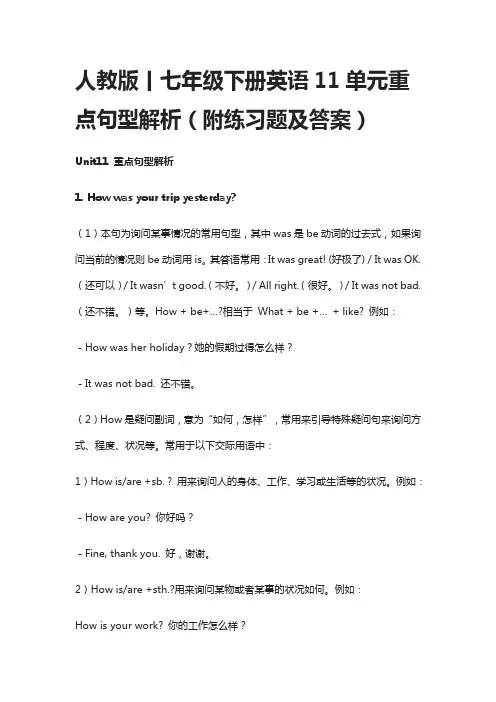
人教版丨七年级下册英语11单元重点句型解析(附练习题及答案)Unit11 重点句型解析1. How was your trip yesterday?(1)本句为询问某事情况的常用句型,其中was是be动词的过去式,如果询问当前的情况则be动词用is。
其答语常用:It was great! (好极了) / It was OK.(还可以)/ It wasn’t good.(不好。
)/ All right.(很好。
)/ It was not bad.(还不错。
)等。
How + be+…?相当于What + be +…+ like? 例如:-How was her holiday?她的假期过得怎么样?-It was not bad. 还不错。
(2)How是疑问副词,意为“如何,怎样”,常用来引导特殊疑问句来询问方式、程度、状况等。
常用于以下交际用语中:1)How is/are +sb. ? 用来询问人的身体、工作、学习或生活等的状况。
例如:-How are you? 你好吗?-Fine, thank you. 好,谢谢。
2)How is/are +sth.?用来询问某物或者某事的状况如何。
例如:How is your work? 你的工作怎么样?3)How do you do? 并不表示疑问,是第一次见面时的问候语,回答仍用此句。
例如:How do you do? 你好!How do you do? 你好!4)How is it going?/ How is everything going? 用来询问事情进展如何。
例如:How is it going? 情况/进展如何?Very well./ Not too bad./just so so.很好。
/还不坏。
/一般吧。
2. Did you see any cows?此句是一个一般过去时的一般疑问句,用于询问过去发生的动作或事情。
句式是“Did+主语+动词原形+其他成分?”。
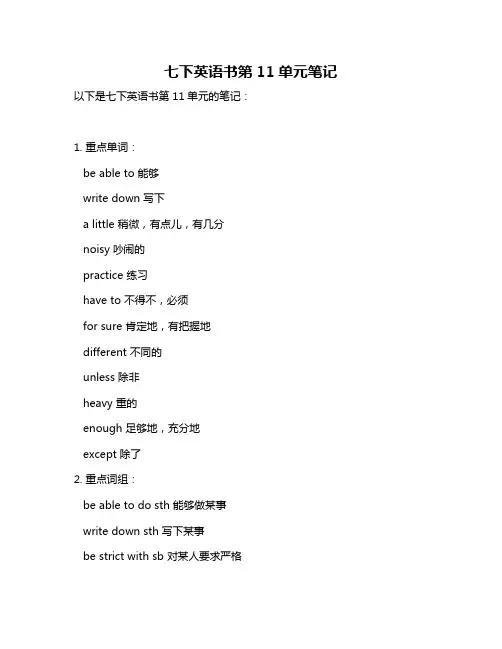
七下英语书第11单元笔记以下是七下英语书第11单元的笔记:
1. 重点单词:
be able to 能够
write down 写下
a little 稍微,有点儿,有几分
noisy 吵闹的
practice 练习
have to 不得不,必须
for sure 肯定地,有把握地
different 不同的
unless 除非
heavy 重的
enough 足够地,充分地
except 除了
2. 重点词组:
be able to do sth 能够做某事
write down sth 写下某事
be strict with sb 对某人要求严格
practice the guitar 练习吉他
3. 重点语法:情态动词“can”和“have to”的用法。
4. 重点句型:
I’m not sure. 我不太确定。
She is really noisy,but she can be very quiet,too. 她真的很吵闹,但有时也非常安静。
5. 学习建议:通过多种方式练习听说读写技能,例如听英语歌曲、看英语电影、阅读英文书籍等。
同时,多加练习语法和句型,提高自己的语言表达能力。
在学习过程中,要善于总结归纳,不断巩固所学知识。
人教版英语七年级下Unit11单词、知识梳理、词汇句式精讲Unit11 单词(音标)milk [mɪlk] v. 挤奶cow [kaʊ] n. 奶牛,母牛;母兽milk a cow给奶牛挤奶horse [hɔː(r)s] n. 马ride a horse骑马feed [fiːd] v.(fed/fed)喂养;饲养feed chickens喂鸡farmer ['fɑː(r)mə(r)] n.农民;农场主quite [kwaɪt] adv.相当;完全quitea lot(of…)许多anything ['enɪθɪŋ](常用于否定句或疑问句)任何东西;任何事物grow [grəʊ] v.种植;生长;发育farm [fɑː(r)m] n.农场v.务农pick [pɪk] v.采;摘excellent ['eksələnt] adj.countryside ['kʌntrɪsaɪd].乡村;农村inthe countryside在乡下;在农村yesterday ['jestə(r)dei] adv.昨天flower ['flaʊə(r)] n.花worry ['wʌri] v.&n.担心;担忧luckily ['lʌkɪli] adv.幸运的;好运的sun [sʌn] n.太阳museum [mjuː'ziəm] n.博物馆fire ['faɪə(r)] n.火;火灾frie station ['steɪʃ(ə)n]消防站painting ['peɪntɪŋ] n.油画;绘画exciting [ɪk'saɪtɪŋ] adj.使人兴奋的;令人激动的lovely ['lʌvli] adj.可爱的expensive [ɪk'spensɪv] adj.昂贵的cheap [tʃiːp] adj.廉价的;便宜的slow [sləʊ] adj.缓慢的;迟缓的fast [fɑːst] adv.&adj. 快地(的)robot ['rəʊbɒt] n.机器人guide [gaɪd] n.导游;向导gift [gɪft] n.礼物;赠品all in all总的来说everything ['evrɪθɪŋ] pron.所有事物;一切interested ['ɪntrəɪstɪd] adj.感兴趣的be interested in…对……感兴趣dark [dɑː(r)k] adj.黑暗的;昏暗的hear [hɪə] v.(heard/hɝ:(r)d)听到;听见Carol ['kærəl]卡罗尔(女名)Unit11 知识梳理【重点短语】1. school trip 学校旅行2. go for a walk 去散步3. milk a cow 挤牛奶4. ride a horse 骑马5. feed chickens 喂鸡6. talk with a farmer 与农民交谈7. take some photos 照相8. ask some questions 问一些问题9. grow apples 种苹果10. show sb. around sp. 带某人逛某地11. learn a lot 学到许多12. pick some strawberries 摘草莓13. last week 上周14.In the countryside 在乡村15. visit my grandparents 拜访我的祖父母16. go fishing 去钓鱼17. sound good 听起来很好18. climb the mountains 去爬山19. play some games 玩一些游戏20. visit a museum 参观博物馆21. visit a fire station 参观消防站22.draw pictures 画画23. go on a school trip 去旅行24 visit the science museum 参观科技博物馆25. how to make a model robot 如何制作机器人模型26. gift shop 礼品店27. buy sth. for sb. =buy sb. sth.为某人买某物28. all in all 总得来说29. be interested in... 对…感兴趣30. be expensive 昂贵的31. not...at all 一点儿也不【重点句型】1.---Did you see any cows? 你见到奶牛了吗---Yes, I did. I saw quite a lot. 我见到了而且见到了很多很多2. ---Did Carol take any photos? 罗尔拍照片了吗?---Yes, she did.是的,她拍了。
七年级下册英语11单元知识点总结一、Unit 11 Good habits1. 词汇good habits: 好习惯bad habits: 坏习惯eat: 吃sleep: 睡觉exercise: 锻炼smoke: 抽烟2. 语法现在进行时态:主语 + am/is/are + 动词 + -ing例如:I am eating an apple now. 我现在正在吃一个苹果。
二、Unit 12 What's the best radio station?1. 词汇radio station: 电台news: 新闻music: 音乐weather report: 天气预报2. 语法比较级:形容词的比较级规则变化例如:big - bigger, nice - nicer, hot - hotter三、Unit 13 Rainy days make me feel sad.1. 词汇rainy: 下雨的sunny: 晴朗的windy: 有风的cloudy: 多云的2. 语法情景描述: 表达天气情况对情绪的影响例如:Rainy days make me feel sad. 下雨的日子让我感到悲伤。
四、Unit 14 I used to be afraid of the dark.1. 词汇afraid: 害怕的dark: 黑暗的used to: 以前2. 语法used to 结构:表示过去的习惯或经历例如:I used to be afraid of the dark. 我以前害怕黑暗。
五、Unit 15 World champion1. 词汇champion: 冠军competition: 比赛record: 记录win: 赢得2. 语法一般过去时态:主语 + 动词过去式例如:He won thepetition last year. 他去年赢得了比赛。
六、Unit 16 I used to make paper planes.1. 词汇paper plane: 纸飞机toy: 玩具imagine: 想象create: 创造2. 语法used to 和 would 结构的区别used to 表示过去的习惯或经历;would 表示过去的习惯或“总是”如此的状态。
七年级下册英语十一单元知识点(一)七年级下册英语十一单元知识点Unit 11: What time do you go to school?•单词1.time (n.): 时间2.daily (adj.): 每天的ually (adv.): 通常4.often (adv.): 经常5.sometimes (adv.): 有时候6.never (adv.): 从不7.o’clock (adv.): …点钟8.get up (phr.): 起床9.go to bed (phr.): 上床睡觉10.watch TV (phr.): 看电视11.do homework (phr.): 做作业•句型1.What time do you…?(你…几点…?)2.I usually…(我通常…)3.I often…(我经常…)4.I sometimes…(我有时候…)5.I never…(我从不…)•问候语1.Good morning!(早上好!)2.Good afternoon!(下午好!)3.Good evening!(晚上好!)4.Good night!(晚安!)•日常活动表达方式1.get up(起床)2.have breakfast(吃早饭)3.go to school(去上学)4.have lunch(吃午饭)5.go home(回家)6.do homework(做作业)7.go to bed(去睡觉)8.watch TV(看电视)Unit 11详解单词解释•time (n.): 时间–Time is an important aspect of our lives. It helps us measure the duration of events and keeps usorganized. Without time, it would be difficult tosynchronize activities and meet deadlines.•daily (adj.): 每天的–Daily activities are the tasks or actions that we do every day. These activities can include taskslike brushing our teeth, eating meals, exercising,and going to school or work.•usually (adv.): 通常–Usually means something is done according to a regular pattern or habit. It implies that theaction or occurrence happens frequently and isexpected to happen in the majority of cases. Forexample, if someone says “I usually have cerealfor breakfast,” it means that having cereal istheir typical or habitual choice for breakfast.•often (adv.): 经常–Often is similar to usually, indicating a high frequency or regularity of an action or occurrence.It suggests that the action or occurrence happensfrequently, but not necessarily all the time. Forinstance, if someone says “I often go to the park,”it means they visit the park frequently, but notnecessarily every day.•sometimes (adv.): 有时候–Sometimes refers to occasional occurrences or actions that happen from time to time, but not asregularly as usually or often. It implies that thefrequency of the action or event is less thanregular. For instance, if someone says “Isometimes eat ice cream,” it means they eat icecream occasionally, but not on a daily basis.•never (adv.): 从不–Never indicates the absence or complete lack of occurrence. It suggests that the action or eventdoes not happen at all or has never occurred. Forexample, if someone says “I never eat spicy food,”it means they do not eat spicy food under anycircumstances.•o’clock (adv.): …点钟–O’clock is used to denote the exact hour when telling time. It is commonly used when talkingabout full hours. For example, “It is six o’clock”means it is exactly 6:00.•get up (phr.): 起床–The phrase “get up” refers to the action of leaving the bed and beginning the day’s activities.It typically follows waking up from sleep orresting. For example, “I usually get up at 7:00 inthe morning” means the person starts their day at7:00.•go to bed (phr.): 上床睡觉–“Go to bed” means to prepare for sleep and lie down in a bed. It indicates the transition frombeing awake to falling asleep. For example, “Iusually go to bed at 10:00 PM” means the persontypically starts their sleep routine at 10:00 PM.•watch TV (phr.): 看电视–The phrase “watch TV” refers to the activity of viewing television programs or content. It involvessitting in front of a television screen andfollowing the visual and audio content displayed.For example, “I like to watch TV in the evenings”means the person enjoys spending time watchingtelevision shows or movies during the evenings.•do homework (phr.): 做作业–“Do homework” means to complete assignments or academic tasks outside of school hours. It involvesstudying or working on assignments, exercises, orprojects assigned by teachers. For example, “Ialways do my homework after school” means theperson has a routine of completing theirassignments once their regular school day is over. 句型解释•What time do you…?(你…几点…?)–This sentence structure is used to ask about the specific time at which someone does a certainactivity. It is commonly used to inquire aboutdaily routines or activities. For example, “What time do you go to bed?” is asking about thespecific bedtime of the person.•I usually…(我通常…)–This phrase is used to express a typical or habitual action that someone regularly does. Itindicates that the action mentioned is theperson’s usual practice. For example, “I usually have breakfast at 8:00 AM” means the persontypically eats breakfast at 8:00 AM.•I often…(我经常…)–“I often” is used to describe a high frequency or regularity of an action. It indicates that theaction mentioned occurs frequently or more commonly than not. For example, “I often go to the park on weekends” means the person frequently visits the park during their free time.•I sometimes…(我有时候…)–This phrase is used to express occasional orinfrequent actions. It indicates that the actionmentioned happens from time to time, but not asregularly as usual or often. For example, “Isometimes eat pizza for dinner” means the personoccasionally chooses pizza for dinner, but it isnot their everyday choice.•I never…(我从不…)–“I never” is used to express the complete absence or lack of occurrence of an action. It indicatesthat the action mentioned does not happen at all.For example, “I never drink coffee” means theperson does not consume coffee under anycircumstances.问候语解释•Good morning!(早上好!)–“Good morning” is a greeting used to wish someonea pleasant day during the morning hours. It isusually said from the start of the day until aroundnoon.•Good afternoon!(下午好!)–“Good afternoon” is a greeting used to wishsomeone a pleasant day during the afternoon hours.It is typically said from around noon until thelate afternoon.•Good evening!(晚上好!)–“Good evening” is a greeting used to wish someonea pleasant evening. It is said when meeting someonein the late afternoon or nighttime.•Good night!(晚安!)–“Good night” is used as a farewell or to say goodbye before someone goes to sleep for the night.It is commonly said as a wish for a restfulnight’s sleep.日常活动表达方式解释•get up(起床)–“Get up” refers to the action of leaving the bed and starting the day’s activities. It indicatesthe transition from being asleep to being awake andready to start the day.•have breakfast(吃早饭)–“Have breakfast” means to eat the first meal of the day, typically taken in the morning afterwaking up. It helps provide energy and nutrients to start the day.•go to school(去上学)–“Go to school” means to travel or move to an educational institution for learning. It refers to the regular attendance of students at theirdesignated school.•have lunch(吃午饭)–“Have lunch” means to eat the midday meal. It is typically eaten around noon or during thedesignated lunch break.•go home(回家)–“Go home” means to return to one’s place of residence or where one lives. It indicates the act of leaving a specific location, such as work orschool, and heading back to one’s house orapartment.•do homework(做作业)–“Do homework” means to complete academic tasks or assignments outside of school hours. It involvesstudying, reading, writing, or working on exercises or projects assigned by teachers.•go to bed(去睡觉)–“Go to bed” means to prepare for sleep and lie down in a bed. It indicates the transition frombeing awake to falling asleep.•watch TV(看电视)–“Watch TV” refers to the activity of viewing television programs or content. It involves sitting in front of a television screen and following thevisual and audio content displayed.以上为七年级下册英语十一单元相关的知识点整理及详解。
七年级下册英语第11单元roleplay翻译。
摘要:I.引言- 介绍七年级下册英语第11单元的roleplay活动II.roleplay的内容和目的- 概述roleplay的主题和场景- 说明roleplay的学习目标III.roleplay的角色分配和准备- 介绍参与roleplay的角色及其特点- 给出角色扮演的建议和技巧IV.roleplay的过程和策略- 描述roleplay的具体步骤和流程- 分析在roleplay中可能遇到的问题及解决方法V.roleplay的总结和反思- 对roleplay活动进行总结和评价- 提出如何提高roleplay效果的建议VI.结论- 重申roleplay的重要性及其在英语学习中的作用正文:【引言】在七年级下册英语第11单元的学习中,我们进行了一次roleplay活动。
这是一种非常有趣且实用的学习方式,能够帮助我们提高口语表达能力,同时也能更好地理解和应用所学的英语知识。
【II.roleplay的内容和目的】本次roleplay的主题是关于日常生活中的购物场景。
学生们通过扮演售货员和顾客的角色,进行实际场景的对话。
这样的设计旨在帮助学生巩固所学的购物相关词汇和表达,同时培养他们的口语交际能力。
【III.roleplay的角色分配和准备】在活动开始前,我们首先对参与roleplay的角色进行了分配。
有的学生扮演售货员,有的则扮演顾客。
为了使角色扮演更加真实,我们还让学生们提前准备好各自的台词和表达。
此外,我们还给出了一些建议和技巧,帮助学生更好地进入角色。
【IV.roleplay的过程和策略】在roleplay过程中,学生们积极参与,勇于开口表达。
他们运用所学的购物相关词汇和句型,进行了一幕幕生动的对话。
尽管在过程中也遇到了一些问题,如词汇遗忘、表达不流利等,但我们及时引导,帮助学生解决问题,使活动得以顺利进行。
【V.roleplay的总结和反思】活动结束后,我们对roleplay进行了总结和评价。
七年级下册英语第11 单元的单词k /mɪlk/ 挤奶-解析:动词,表示从奶牛等动物身上挤出乳汁。
-例句:I helped my grandpa milk the cows.(我帮爷爷挤牛奶。
)2.cow /kaʊ/ 奶牛-解析:一种常见的家畜,能提供牛奶等。
-例句:There are many cows on the farm.(农场里有很多奶牛。
)3.horse /hɔːs/ 马-解析:一种动物,可用于骑乘、拉车等。
-例句:He likes to ride a horse.(他喜欢骑马。
)4.feed /fiːd/ 喂养;饲养-解析:给动物或人提供食物。
-例句:She feeds the chickens every morning.(她每天早上喂鸡。
)5.farmer /ˈfɑːmə(r)/ 农民;农场主-解析:从事农业生产的人。
-例句:The farmer is working in the field.(农民在田里劳作。
)6.quite /kwaɪt/ 相当;完全-解析:副词,表示程度比较高。
-例句:It's quite beautiful here.(这里相当美丽。
)7.anything /ˈeniθɪŋ/ 任何事物;任何东西-解析:不定代词,用于疑问句和否定句中。
-例句:Is there anything interesting in the book?(这本书里有什么有趣的东西吗?)8.grow /ɡrəʊ/ 种植;生长;发育-解析:可以表示种植植物,也可以表示生物的生长。
-例句:We grow vegetables in our garden.(我们在花园里种蔬菜。
)/ The child is growing fast.(孩子长得很快。
)9.farm /fɑːm/ 农场;务农;种田-解析:名词表示进行农业生产的地方;动词表示从事农业活动。
-例句:They live on a farm.(他们住在一个农场里。
七年级下册英语第11单元语法七年级下册英语第11单元语法主要包括以下内容:1. 一般现在时- 表示经常性、习惯性的动作或状态,常与时间状语词(如always, often, usually)连用。
- 特殊疑问句和一般疑问句的构成方式。
2. 一般过去时- 表示过去某个时间发生的动作或状态。
- 规则动词的过去式构成。
- 特殊疑问句和一般疑问句的构成方式。
3. 动词的过去式变化- 一般情况下直接加-ed。
- 以不发音的e结尾的动词直接加-d。
- 以辅音字母+y结尾的动词,变y为i,再加-ed。
4. 一般将来时- 表示将来发生的动作或状态。
- 构成方式:will/shall + 动词原形。
5. 一般将来时的特殊疑问句和一般疑问句- 特殊疑问句:特殊疑问词 + will/shall + 主语 + 动词原形。
- 一般疑问句:将will/shall提前到句首。
以上是七年级下册英语第11单元语法的主要内容。
七年级下册英语第11单元语法主要包括以下内容:1. 一般现在时- 表示经常性、习惯性的动作或状态,常与时间状语词(如always, often, usually)连用。
- 特殊疑问句和一般疑问句的构成方式。
2. 一般过去时- 表示过去某个时间发生的动作或状态。
- 规则动词的过去式构成。
- 特殊疑问句和一般疑问句的构成方式。
3. 动词的过去式变化- 一般情况下直接加-ed。
- 以不发音的e结尾的动词直接加-d。
- 以辅音字母+y结尾的动词,变y为i,再加-ed。
4. 一般将来时- 表示将来发生的动作或状态。
- 构成方式:will/shall + 动词原形。
5. 一般将来时的特殊疑问句和一般疑问句- 特殊疑问句:特殊疑问词 + will/shall + 主语 + 动词原形。
- 一般疑问句:将will/shall提前到句首。
以上是七年级下册英语第11单元语法的主要内容。